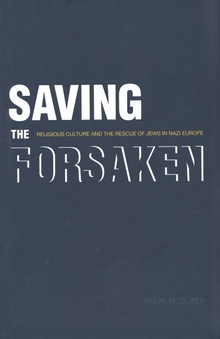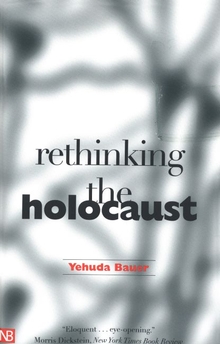Saving the Forsaken
WARNING
You are viewing an older version of the Yalebooks website. Please visit out new website with more updated information and a better user experience: https://www.yalebooks.com
Religious Culture and the Rescue of Jews in Nazi Europe
Pearl M. Oliner; With statistical analysis by Jeanne Wielgus and Mary B. Gruber
Does religion encourage altruism on behalf of those who do not belong? Are the very religious more likely to be altruistic toward outsiders than those who are less religious? In this book Pearl M. Oliner examines data on Christian rescuers and nonrescuers of Jews during the Holocaust to shed light on these important questions.
Drawing on interviews with more than five hundred Christians—Protestant and Catholic, very religious, irreligious, and moderately religious rescuers and nonrescuers living in Nazi-occupied Europe, Oliner offers a sociological perspective on the values and attitudes that distinguished each group. She presents several case studies of rescuers and nonrescuers within each group and then interprets the individual’s behavior as it relates to his or her group. She finds that the value patterns of the religious groups differ significantly from one another, and she is able to highlight those factors that appear to have contributed most toward rescue within each group.
Pearl M. Oliner, professor emeritus of education at Humboldt State University, is also research director of the Altruistic Personality and Prosocial Behavior Institute at Humboldt State University. Her other books include The Altruistic Personality and Toward a Caring Society.
“A very significant work of social science with rich humanitarian and ethical implications. It will make the world in which we all live better than it was and is.”—Amitai Etzioni, Author of The New Golden Rule and The Moral Dimension
“An important contribution to the fields of holocaust studies, sociology, and psychology.”—David Blumenthal, Emory University
“At last some answers to: What role did religion play among rescuers? Did being ‘more’ religious make a difference? Even more importantly: How can social norms be changed to create more caring societies?”—David R. Blumenthal, author of The Banality of Good and Evil: Moral Lessons from the Shoah and Jewish Tradition
“This highly readable book is indisputably an important work, bound to be of great interest to readers within academia and outside it. It addresses questions that loom ever larger in our day, when inter-group strife and violence seem to be accelerating, and religion’s role grows increasingly conspicuous and ambiguous. And the interweaving of qualitative and quantitative data is masterfully carried out.”—David Wulff, Wheaton College, Norton, Massachusetts
“Clear writing, impeccable research, penetrating insight about the history of the Holocaust, and wise analysis of crucial moral issues—these qualities identify Pearl Oliner’s Saving the Forsaken as a stellar example of the ways in which detailed sociological analysis can provide guidance to encourage life-saving conduct even in the most perilous of times.”—John K. Roth, Claremont McKenna College
“In this book, Pearl Oliner provides keen insight into the complex role of religion in people’s decisions to help another at a great potential cost to the self. This work is a valuable addition to the nascent but growing literature on the role of religion in altruism and positive behavior. Dr. Oliner’s analysis of data and illustrative examples from a landmark study will be useful to other individuals attempting to understand when, how, and why religion motives sometimes contribute to moral behavior.”—Nancy Eisenberg, Arizona State University
Publication Date: March 8, 2005
9 b/w illus.








